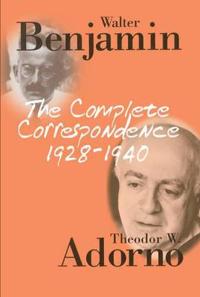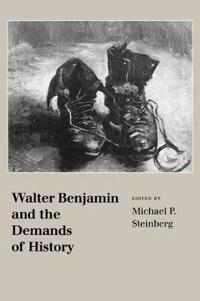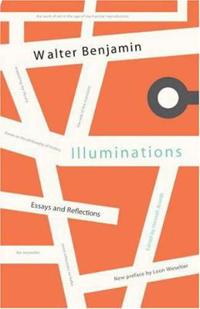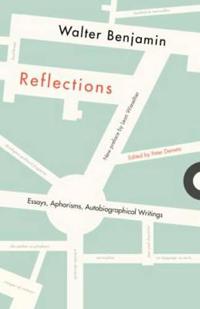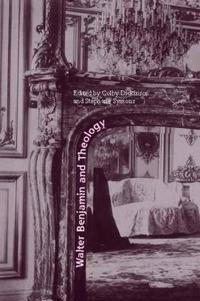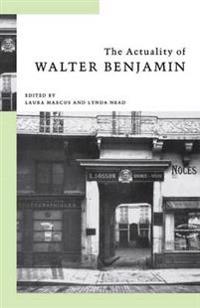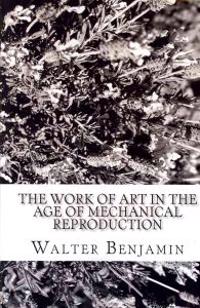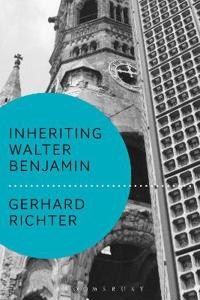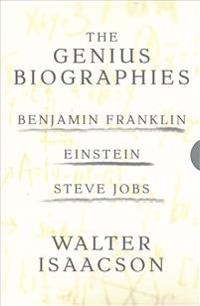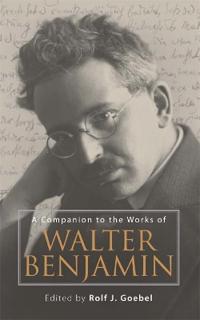The Complete Correspondence 1928-1940 (Häftad)
avTheodor W. Adorno, Walter Benjamin
ISBN: 9780745632148 - UTGIVEN: 200309The surviving correspondence between Walter Benjamin and Theodor W. Adorno. * This is the first time all of the surviving correspondence between Adorno and Benjamin has appeared in English. * Provides a key to the personalities and projects of these two major intellectual figures. * Offers a compe[...]
Correspondence 1930-1940 (Inbunden)
avGretel Adorno, Walter Benjamin
ISBN: 9780745636696 - UTGIVEN: 2008-01-31Walter Benjamin and the Media: The Spectacle of Modernity (Häftad)
avJaeho Kang
ISBN: 9780745645209 - UTGIVEN: 2014-07-31An accessible introduction to Walter Benjamin's theory of the media Provides a close reading of Benjamin's work on the intersection between media and modern experience Examines the relevance and implications of Benjamin's work for media studies today Offers new insight into critical theoretical a[...]
Walter Benjamin and the Media: The Spectacle of Modernity (Häftad)
avJaeho Kang
ISBN: 9780745645216 - UTGIVEN: 2014-07-31An accessible introduction to Walter Benjamin's theory of the media Provides a close reading of Benjamin's work on the intersection between media and modern experience Examines the relevance and implications of Benjamin's work for media studies today Offers new insight into critical theoretical a[...]
Walter Benjamin and the Demands of History (Pocket)
avMichael P. (EDT) Steinberg
ISBN: 9780801482571 - UTGIVEN: 1996-07Walter Benjamin (Häftad)
avSigrid Weigel
ISBN: 9780804780605 - UTGIVEN: 2013-01Arguing that the importance of painting and other visual art for Benjamin's epistemology has yet to be appreciated, Weigel undertakes the first systematic analysis of their significance to his thought. She does so by exploring Benjamin's dialectics of secularization, an approach that allows Benjamin[...]
Reflections (Häftad)
avWalter Benjamin
ISBN: 9780805208023 - UTGIVEN: 199505Deals with surrealism, Brecht, Berlin, Paris, Moscow, Marseilles, Naples, violence, fate, language, and character[...]
Microscripts (Pocket)
avRobert Walser, Susan Bernofsky, Walter Benjamin
ISBN: 9780811220330 - UTGIVEN: 201211Robert Walser wrote many of his manuscripts in a highly enigmatic, shrunken-down form. These narrow strips of paper, covered with tiny ant-like pencil markings a millimeter high, came to light only after the author 's death in 1956.At first considered random restless pencil markings or a secret code[...]
Walter Benjamin and Theology
ISBN: 9780823270187 - UTGIVEN: 2016-05In the Arcades Project, Walter Benjamin writes that his work is "related to theology as blotting pad is related to ink. It is saturated with it." For a thinker so decisive to critical literary, cultural, political, and aesthetic writings over the past half-century, Benjamin's relationship to theolog[...]
Walter Benjamin and the Arcades Project (Häftad)
avBeatrice Hanssen
ISBN: 9780826463876 - UTGIVEN: 200607This is the first comprehensive introduction to Benjamin's unfinished "Arcades Project" - one of the most significant cultural documents of the Weimar Republic and Nazi era. Walter Benjamin's unfinished "Arcades Project" has had a remarkable impact on present-day cultural theory, urban studies, cult[...]
The Actuality of Walter Benjamin
ISBN: 9780853158639 - UTGIVEN: 1999-03This collection shows how extraordinarily substantial were the theoretical footholds which Walter Benjamin supplied. The contributors engage with Benjamin on a number of levels, with essays on historical understanding versus historicism, a look at gender and dialectical images, the space of the city[...]
Walter Benjamin's Concept of the Image (häftad)
ISBN: 9781138699083 - UTGIVEN: 2016-05In this book, Alison Ross engages in a detailed study of Walter Benjamin's concept of the image, exploring the significant shifts in Benjamin's approach to the topic over the course of his career. Using Kant's treatment of the topic of sensuous form in his aesthetics as a comparative reference, Ross[...]
Walter Benjamin?s Concept of the Image (Inbunden)
avAlison Ross
ISBN: 9781138811485 - UTGIVEN: 2014-11In this book, Alison Ross engages in a detailed study of Walter Benjamin's concept of the image, exploring the significant shifts in Benjamin's approach to the topic over the course of his career. Using Kant's treatment of the topic of sensuous form in his aesthetics as a comparative reference, Ross[...]
Catastrophe And Survival: Walter Benjamin And Psychoanalysis (Övrig)
avElizabeth Stewart
ISBN: 9781441116833 - UTGIVEN: 2012-06-21Walter Benjamin and Psychoanalysis.
The Late Walter Benjamin (Pocket)
avJohn Schad
ISBN: 9781441177681 - UTGIVEN: 2012-05-03Explores the life and thought of Walter Benjamin, imaginatively examining its implications in the political context of a post-War London estate. This title explores the emergence of Benjamin's thinking from a politicised Jewish theology forced to confront the rise of Nazism.[...]
The Work of Art in the Age of Mechanical Reproduction (Häftad)
avWalter Benjamin
ISBN: 9781453722480 - UTGIVEN: 2010-09Towards the Critique of Violence: Walter Benjamin and Giorgio Agamben (häftad)
ISBN: 9781474241892 - UTGIVEN: 2017-08In the past two and a half decades, Walter Benjamin's early essay 'Towards the Critique of Violence' (1921) has taken a central place in politico-philosophic debates. The complexity and perhaps even the occasional obscurity of Benjamin's text have undoubtedly contributed to the diversity, conflict, [...]
Inheriting Walter Benjamin (häftad)
ISBN: 9781474251235 - UTGIVEN: 2016-02Gerhard Richter examines, in the work of Walter Benjamin, one of the central problems of modernity: the question of how to receive an intellectual inheritance. Covering aspects of Benjamin's complex relationship to the legacies of such writers as Kant, Nietzsche, Kafka, Heidegger, and Derrida, e[...]
Inheriting Walter Benjamin
ISBN: 9781474251242 - UTGIVEN: 2016-01Gerhard Richter examines, in the work of Walter Benjamin, one of the central problems of modernity: the question of how to receive an intellectual inheritance. Covering aspects of Benjamin's complex relationship to the legacies of such writers as Kant, Nietzsche, Kafka, Heidegger, and Derrida, e[...]
Walter Isaacson: The Genius Biographies: Benjamin Franklin, Einstein, and Steve Jobs (häftad)
ISBN: 9781501189012 - UTGIVEN: 2017-11The Genius Biographies boxed set from New York Times bestselling author Walter Isaacson featuring his definitive biographies: Steve Jobs, Einstein, and Benjamin Franklin. "If anybody in America understands genius, it's Walter Isaacson." --Salon Walter Isaacson's beloved biographies of American geniu[...]
Das Kunstwerk Im Zeitalter Seiner Technischen Reproduzierbarkeit: Die Drei Deutschen Fassungen in Einem Band (Häftad)
avWalter Benjamin
ISBN: 9781507856826 - UTGIVEN: 2015-02A Companion to the Works of Walter Benjamin (Inbunden)
avRolf J. (EDT) Goebel
ISBN: 9781571133670 - UTGIVEN: 2009-11Walter Benjamin (1892-1940) has emerged as one of the leading cultural critics of the twentieth century. His work encompasses aesthetics, metaphysical language and narrative theories, German literary history, philosophies of history, the intersection of Marxism and Messianic thought, urban topograph[...]

